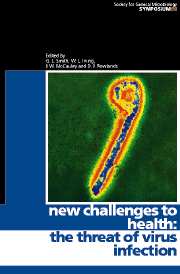Book contents
- Frontmatter
- Contents
- Contributors
- Editors' Preface
- 1 The viruses in our past, the viruses in our future
- 2 Dynamics and epidemiological impact of microparasites
- 3 The continuing threat of bunyaviruses and hantaviruses
- 4 Calicivirus, myxoma virus and the wild rabbit in Australia: a tale of three invasions
- 5 Potential of influenza A viruses to cause pandemics
- 6 The hepatitis viruses as emerging agents of infectious diseases
- 7 The emergence of human immunodeficiency viruses and AIDS
- 8 Morbilliviruses: dangers old and new
- 9 Structure–function analysis of prion protein
- 10 Endogenous retroviruses and xenotransplantation
- 11 Gammaherpesviral infections and neoplasia in immunocompromised populations
- 12 Structure and function of the proteins of Marburg and Ebola viruses
- 13 Epidemic dengue/dengue haemorrhagic fever as a public health problem in the 21st century
- 14 Borna disease virus – a threat for human mental health?
- 15 Antiviral drug development and the impact of drug resistance
- Index
Editors' Preface
Published online by Cambridge University Press: 06 July 2010
- Frontmatter
- Contents
- Contributors
- Editors' Preface
- 1 The viruses in our past, the viruses in our future
- 2 Dynamics and epidemiological impact of microparasites
- 3 The continuing threat of bunyaviruses and hantaviruses
- 4 Calicivirus, myxoma virus and the wild rabbit in Australia: a tale of three invasions
- 5 Potential of influenza A viruses to cause pandemics
- 6 The hepatitis viruses as emerging agents of infectious diseases
- 7 The emergence of human immunodeficiency viruses and AIDS
- 8 Morbilliviruses: dangers old and new
- 9 Structure–function analysis of prion protein
- 10 Endogenous retroviruses and xenotransplantation
- 11 Gammaherpesviral infections and neoplasia in immunocompromised populations
- 12 Structure and function of the proteins of Marburg and Ebola viruses
- 13 Epidemic dengue/dengue haemorrhagic fever as a public health problem in the 21st century
- 14 Borna disease virus – a threat for human mental health?
- 15 Antiviral drug development and the impact of drug resistance
- Index
Summary
This book presents the proceedings of a meeting ‘New Challenges to Health: The Threat of Virus Infection’ organized by the Society for General Microbiology at Heriot- Watt University, Edinburgh, in March 2001. The purpose of the meeting was to review the continuing threat of viruses (and prions) to human and animal health. Although several virus diseases have been controlled by vaccination (such as polio, measles, mumps, rubella and yellow fever) and one (smallpox) has been eradicated, viruses remain a potent threat to human and animal health due to their ability to evolve and adapt rapidly. For viruses such as influenza and HIV, the ability to undergo rapid antigenic variation enables them to evade existing immunity and cause disease. Viruses may adapt to new situations, such as changes in the population density of human, animal or insect hosts, or the presence of substantial numbers of immunosuppressed individuals, and cause disease where hitherto they were unable to do so. Rapid virus evolution also enables virus strains to arise that are resistant to existing antiviral drugs. The book starts with a consideration of the mathematical modelling of epidemic virus infections, and the surveillance and emergence of virus infections. There follow chapters that review the molecular and cell biological mechanisms by which viruses and prions may induce disease. These include influenza and HIV, the devastating haemorrhagic diseases caused by Ebola and Marburg viruses, prion diseases such as BSE and variant CJD, certain psychiatric illness, and how the emergence of drug-resistant strains of virus poses a major problem for antiviral chemotherapy.
- Type
- Chapter
- Information
- New Challenges to HealthThe Threat of Virus Infection, pp. xi - xiiPublisher: Cambridge University PressPrint publication year: 2001

